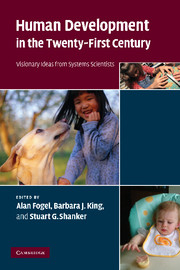Book contents
- Frontmatter
- Contents
- List of contributors
- Introduction: Why a dynamic systems approach to fostering human development?
- Part I Dynamic relationships between genetics and environments
- Part II The dynamic system of the child in the family
- 6 Relationships that support human development
- 7 The impact of emotions and the emotional impact of a child's first words
- 8 Emotional habits in brain and behavior: a window on personality development
- 9 Creating family love: an evolutionary perspective
- Part III The dynamic system of the child in social and physical environment
- Part IV Dynamic systems approaches to mental health
- Part V Conclusions and outlook
- Index
- References
9 - Creating family love: an evolutionary perspective
Published online by Cambridge University Press: 22 September 2009
- Frontmatter
- Contents
- List of contributors
- Introduction: Why a dynamic systems approach to fostering human development?
- Part I Dynamic relationships between genetics and environments
- Part II The dynamic system of the child in the family
- 6 Relationships that support human development
- 7 The impact of emotions and the emotional impact of a child's first words
- 8 Emotional habits in brain and behavior: a window on personality development
- 9 Creating family love: an evolutionary perspective
- Part III The dynamic system of the child in social and physical environment
- Part IV Dynamic systems approaches to mental health
- Part V Conclusions and outlook
- Index
- References
Summary
One day after her birth, infant Elikya gazes up at her mother, who holds her. Elikya moves her head down, then again gazes up at her mom, then moves her head down once more. Her mother, using her whole hand, moves Elikya's head back up, and gazes into her eyes.
Once in a while, Elikya's mother needs a break from caring for her. One day when Elikya is a bit over two months old, her mom hands her over to an older sister. As she is transferred, Elikya makes a facial pout towards her mother. While held by her sister, Elikya extends her arm three times in succession toward her mother. Although Elikya is close enough to touch her mother if she chooses, she instead makes this gesture, slowly and deliberately. As Elikya is making the third gesture, her mother takes Elikya back. As Elikya relaxes against her mother's body, her sister pats her gently.
As she matures, Elikya becomes more independent in terms of movement and locomotion. At nearly a year of age, Elikya moves far away from her mother. She comes upon her older brother, who is reclining, on his back, in an old suspended tire. Elikya extends one leg, with toes spread slightly apart, toward her brother. As he extends his own leg toward hers, Elikya proceeds forward and climbs onto his chest. The brother gives her big, broad, pats on the back as he clasps her in an embrace.
- Type
- Chapter
- Information
- Human Development in the Twenty-First CenturyVisionary Ideas from Systems Scientists, pp. 81 - 88Publisher: Cambridge University PressPrint publication year: 2007
References
- 1
- Cited by



